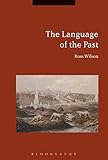The language of the past / Ross Wilson.
Material type: TextPublisher: London ; Oxford ; New York : Bloomsbury Academic, an imprint of Bloomsbury Publishing Plc, 2016Description: 248 pages : illustrations ; 24 cmContent type: text Media type: unmediated Carrier type: volumeISBN: 9781474246637; 147424663XSubject(s): History -- Terminology | History -- Methodology | History -- Philosophy | English language -- Discourse analysis -- Social aspects | English language -- Discourse analysis -- Political aspects | Historiography -- Philosophy | Social history -- Philosophy | Linguistics -- Philosophy | English-speaking countries -- Social conditions | English-speaking countries -- Intellectual life | HISTORY -- General | HISTORY -- HistoriographyAdditional physical formats: Online version:: Language of the past.DDC classification: 901/.4 LOC classification: D16.135 | .W55 2016Other classification: HIS000000 | HIS016000
TextPublisher: London ; Oxford ; New York : Bloomsbury Academic, an imprint of Bloomsbury Publishing Plc, 2016Description: 248 pages : illustrations ; 24 cmContent type: text Media type: unmediated Carrier type: volumeISBN: 9781474246637; 147424663XSubject(s): History -- Terminology | History -- Methodology | History -- Philosophy | English language -- Discourse analysis -- Social aspects | English language -- Discourse analysis -- Political aspects | Historiography -- Philosophy | Social history -- Philosophy | Linguistics -- Philosophy | English-speaking countries -- Social conditions | English-speaking countries -- Intellectual life | HISTORY -- General | HISTORY -- HistoriographyAdditional physical formats: Online version:: Language of the past.DDC classification: 901/.4 LOC classification: D16.135 | .W55 2016Other classification: HIS000000 | HIS016000 | Item type | Current library | Call number | Copy number | Status | Notes | Date due | Barcode |
|---|---|---|---|---|---|---|---|
 Books
Books
|
Female Library | D16.135 .W55 2016 (Browse shelf (Opens below)) | 1 | Available | STACKS | 51952000326540 | |
 Books
Books
|
Main Library | D16.135 .W55 2016 (Browse shelf (Opens below)) | 1 | Available | STACKS | 51952000326557 |
"Details the history and contemporary usage of terms and phrases associated with prehistoric, ancient, medieval or modern periods, employed within Anglophone countries to describe social, cultural or political situations in the present"-- Provided by publisher.
"The Language of the Past analyzes the use of history in discourses within the political, media and the public sphere. It examines how particular terms, phrases and allusions first came into usage, developed and how they are employed today. To speak of something or someone as representing the 'stone age, ' or characterize an institution as 'byzantine, ' to describe a business relationship as 'feudal' or to disparage ideals or morality as 'Victorian, ' refers to both a perception of the past and its relationship to the present. Whilst dictionaries and etymologies define meanings and origin points of words or phrases, this study examines how history is maintained and used within society through language. Detailing the specific words and phrases associated with particular periods used to describe contemporary society, this thorough examination of language and history will be of great interest to those studying historiography, social history and linguistics"-- Provided by publisher.
Includes bibliographical references (pages 197-243) and index.
1. Speaking about the Past -- 2. Prehistoric -- 3. Ancient -- 4. Medieval -- 5. Modern -- 6. Conclusions.
1 2

There are no comments on this title.